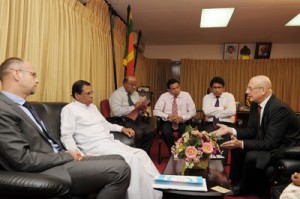Sri Lanka has great opportunity to beat AIDS : UNAIDS expert
View(s):Sri Lanka has a great opportunity to beat the AIDs epidemic in the next two years owing to its effective mother-child health care services system, a regional expert said.
“From what I have seen in Sri Lanka, your country has a great opportunity to end AIDS; (I mean) not manage AIDS but end AIDS (totally),” noted a confident Steve Krauss, Regional Director – UNAIDS in Colombo last week.
In between meetings with government officials and civil society activists, Mr Krauss told the Business Times in an interview that Sri Lanka has a good mother-child healthcare service. There are 350,000 new births a year and almost everyone delivery takes place at a healthcare facility. “If you can add HIV screening to current (mother-care) programmes, Sri Lanka can eliminate mother to child transmission,” he added.
His visit here coincided with the launch of the UNAIDS Report on the global AIDS epidemic on November 20 in Geneva. According to that report, nearly 5 million people were living with HIV in South, South-East and East Asia combined in 2011.
In Bangladesh, Indonesia, the Philippines and Sri Lanka, the rate of new HIV infections increased by more than 25 per cent between 2001 and 2011, the report said, adding “HIV epidemics in Asia and the Pacific remain largely concentrated among injecting drug users, men who have sex with men and sex workers”.
Mr Krauss said in middle income countries, there are still children being born with HIV. “There is no reason for it. All the technology, all the knowledge we need (to prevent this) exists,” he said. “No woman should die giving life, she should have access to safe motherhood programmes – and no child should be HIV infected through the birthing process. We can eliminate that with local funds’ resources and (Sri Lanka’s) Ministry of Health also wants to do it,” he added.
AIDS is caused by HIV, the human immunodeficiency virus. HIV destroys the body’s ability to fight off infection and disease, which can ultimately lead to death.
Mr Krauss called on Sri Lanka to undertake serious legal reforms particularly (removing) Section 377 of the Penal Code in decriminalising – just like the Indian example – sex acts between homosexuals.
“What we have seen in too many countries is universal obstacles; not universal access – like the vagrancy law on sex workers… old colonial laws that penalize same sex relationships. We need to decriminalize such sexual activity,” he said, arguing that “we can and we must –if we are to be successful – leverage a rights based response if we are to see a public health

Seen here Mr. Krauss (right) with Health Minister Maithripala Sirisena
impact.”
He said health and human rights go hand in hand and Sri Lanka is capable of having an intelligent, capable dialogue with society on whether there is a need to continue ancient colonial laws and practices. “Do we want to criminalise consensual, adult sex in private? Do we want to fill our prisons with people who have a chronic relapsing health condition called drug use?”
He said there is a need to work with the community in removing these archaic laws. “You can’t be arresting sex workers, putting them in jail and at the same time telling them we (Sri Lanka) really want you to come and get tested (or use condoms)?” he said, adding: “You need to create a supportive environment for key (at-risk of HIV/AIDS)) populations to feel safe to come and get treatment.”
He said Sri Lanka is seriously considering introducing Opioid substitution therapy (OST) which is a proven intervention for drug users.
“The use of OST can control chemical dependency among drug users and make them become productive citizens. China, Vietnam, Cambodia, Indonesia and Bangladesh are doing this. So there are already best practices in your backyard.”
OST is the recommended form of drug dependence treatment for people who are dependent on opioids, according to UNAIDS.
All is not gloom. In Asia and the Pacific, there’s a lot of good news with Cambodia, India, Malaysia, Myanmar, Nepal, Papua New Guinea and Thailand seeing a 25 per cent or more reduction in new (HIV) infections. “Many people thought Asia would turn into a huge disaster. What it proves is that if you do the right thing the right way, you get great results,” he said, praising the political leadership in many countries including China, India and Thailand for the progress seen in these areas.
Ten years ago, China for example had less than four centres for opium substitution but today has over 800 centres. Countries like Fiji have changed laws on men having sex with men while Pakistan brought laws two years ago for the inclusion of a third gender where one can be (in passport identification, etc) either a male, female or a third gender. The same gender rule exists in Nepal.
According to David Bridger, Country Coordinator – UNAIDS Sri Lanka and the Maldives, another positive development here is that the private sector is pushing insurance companies to include HIV/AIDS in health insurance policies. “HIV is regarded as a life threatening illness. So insurance policies exclude persons living with HIV from getting health insurance but hopefully that is changing,” he said.
Follow @timesonlinelk
comments powered by Disqus
























